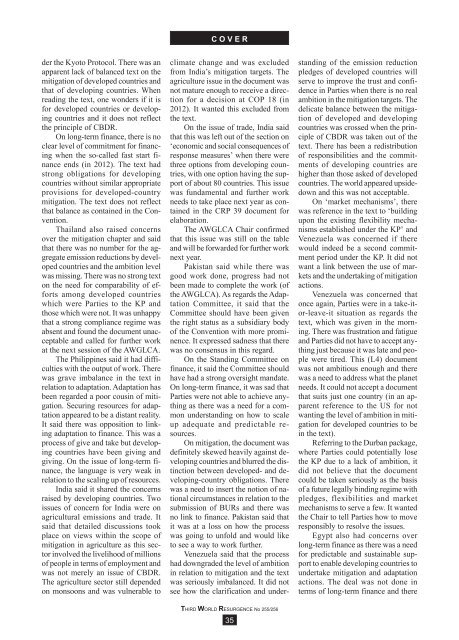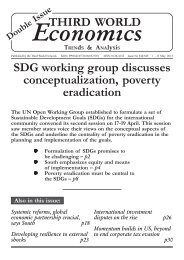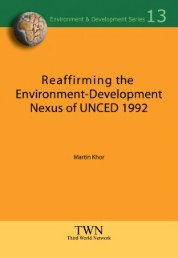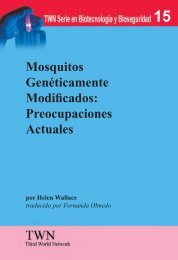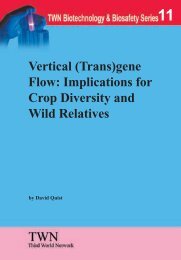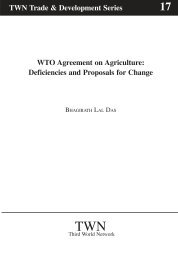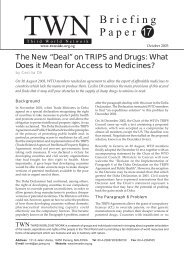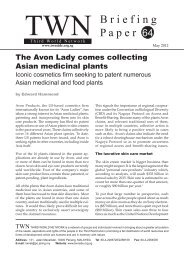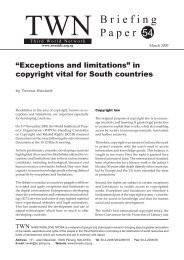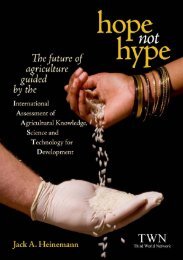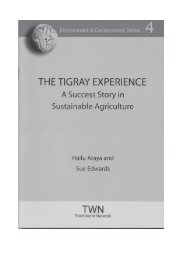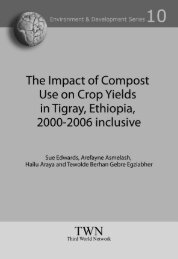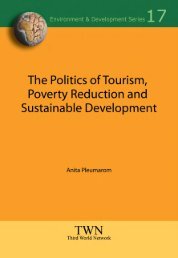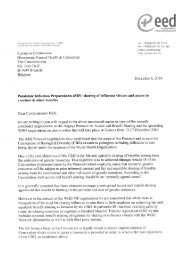Download - Third World Network
Download - Third World Network
Download - Third World Network
Create successful ePaper yourself
Turn your PDF publications into a flip-book with our unique Google optimized e-Paper software.
C O V E R<br />
der the Kyoto Protocol. There was an<br />
apparent lack of balanced text on the<br />
mitigation of developed countries and<br />
that of developing countries. When<br />
reading the text, one wonders if it is<br />
for developed countries or developing<br />
countries and it does not reflect<br />
the principle of CBDR.<br />
On long-term finance, there is no<br />
clear level of commitment for financing<br />
when the so-called fast start finance<br />
ends (in 2012). The text had<br />
strong obligations for developing<br />
countries without similar appropriate<br />
provisions for developed-country<br />
mitigation. The text does not reflect<br />
that balance as contained in the Convention.<br />
Thailand also raised concerns<br />
over the mitigation chapter and said<br />
that there was no number for the aggregate<br />
emission reductions by developed<br />
countries and the ambition level<br />
was missing. There was no strong text<br />
on the need for comparability of efforts<br />
among developed countries<br />
which were Parties to the KP and<br />
those which were not. It was unhappy<br />
that a strong compliance regime was<br />
absent and found the document unacceptable<br />
and called for further work<br />
at the next session of the AWGLCA.<br />
The Philippines said it had difficulties<br />
with the output of work. There<br />
was grave imbalance in the text in<br />
relation to adaptation. Adaptation has<br />
been regarded a poor cousin of mitigation.<br />
Securing resources for adaptation<br />
appeared to be a distant reality.<br />
It said there was opposition to linking<br />
adaptation to finance. This was a<br />
process of give and take but developing<br />
countries have been giving and<br />
giving. On the issue of long-term finance,<br />
the language is very weak in<br />
relation to the scaling up of resources.<br />
India said it shared the concerns<br />
raised by developing countries. Two<br />
issues of concern for India were on<br />
agricultural emissions and trade. It<br />
said that detailed discussions took<br />
place on views within the scope of<br />
mitigation in agriculture as this sector<br />
involved the livelihood of millions<br />
of people in terms of employment and<br />
was not merely an issue of CBDR.<br />
The agriculture sector still depended<br />
on monsoons and was vulnerable to<br />
climate change and was excluded<br />
from India’s mitigation targets. The<br />
agriculture issue in the document was<br />
not mature enough to receive a direction<br />
for a decision at COP 18 (in<br />
2012). It wanted this excluded from<br />
the text.<br />
On the issue of trade, India said<br />
that this was left out of the section on<br />
‘economic and social consequences of<br />
response measures’ when there were<br />
three options from developing countries,<br />
with one option having the support<br />
of about 80 countries. This issue<br />
was fundamental and further work<br />
needs to take place next year as contained<br />
in the CRP 39 document for<br />
elaboration.<br />
The AWGLCA Chair confirmed<br />
that this issue was still on the table<br />
and will be forwarded for further work<br />
next year.<br />
Pakistan said while there was<br />
good work done, progress had not<br />
been made to complete the work (of<br />
the AWGLCA). As regards the Adaptation<br />
Committee, it said that the<br />
Committee should have been given<br />
the right status as a subsidiary body<br />
of the Convention with more prominence.<br />
It expressed sadness that there<br />
was no consensus in this regard.<br />
On the Standing Committee on<br />
finance, it said the Committee should<br />
have had a strong oversight mandate.<br />
On long-term finance, it was sad that<br />
Parties were not able to achieve anything<br />
as there was a need for a common<br />
understanding on how to scale<br />
up adequate and predictable resources.<br />
On mitigation, the document was<br />
definitely skewed heavily against developing<br />
countries and blurred the distinction<br />
between developed- and developing-country<br />
obligations. There<br />
was a need to insert the notion of national<br />
circumstances in relation to the<br />
submission of BURs and there was<br />
no link to finance. Pakistan said that<br />
it was at a loss on how the process<br />
was going to unfold and would like<br />
to see a way to work further.<br />
Venezuela said that the process<br />
had downgraded the level of ambition<br />
in relation to mitigation and the text<br />
was seriously imbalanced. It did not<br />
see how the clarification and understanding<br />
of the emission reduction<br />
pledges of developed countries will<br />
serve to improve the trust and confidence<br />
in Parties when there is no real<br />
ambition in the mitigation targets. The<br />
delicate balance between the mitigation<br />
of developed and developing<br />
countries was crossed when the principle<br />
of CBDR was taken out of the<br />
text. There has been a redistribution<br />
of responsibilities and the commitments<br />
of developing countries are<br />
higher than those asked of developed<br />
countries. The world appeared upsidedown<br />
and this was not acceptable.<br />
On ‘market mechanisms’, there<br />
was reference in the text to ‘building<br />
upon the existing flexibility mechanisms<br />
established under the KP’ and<br />
Venezuela was concerned if there<br />
would indeed be a second commitment<br />
period under the KP. It did not<br />
want a link between the use of markets<br />
and the undertaking of mitigation<br />
actions.<br />
Venezuela was concerned that<br />
once again, Parties were in a take-itor-leave-it<br />
situation as regards the<br />
text, which was given in the morning.<br />
There was frustration and fatigue<br />
and Parties did not have to accept anything<br />
just because it was late and people<br />
were tired. This (L4) document<br />
was not ambitious enough and there<br />
was a need to address what the planet<br />
needs. It could not accept a document<br />
that suits just one country (in an apparent<br />
reference to the US for not<br />
wanting the level of ambition in mitigation<br />
for developed countries to be<br />
in the text).<br />
Referring to the Durban package,<br />
where Parties could potentially lose<br />
the KP due to a lack of ambition, it<br />
did not believe that the document<br />
could be taken seriously as the basis<br />
of a future legally binding regime with<br />
pledges, flexibilities and market<br />
mechanisms to serve a few. It wanted<br />
the Chair to tell Parties how to move<br />
responsibly to resolve the issues.<br />
Egypt also had concerns over<br />
long-term finance as there was a need<br />
for predictable and sustainable support<br />
to enable developing countries to<br />
undertake mitigation and adaptation<br />
actions. The deal was not done in<br />
terms of long-term finance and there<br />
THIRD WORLD RESURGENCE No 255/256<br />
35


